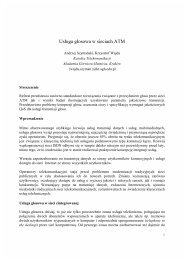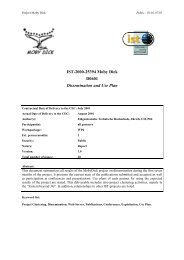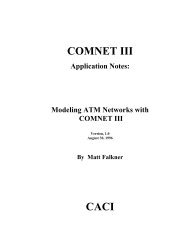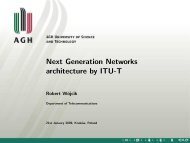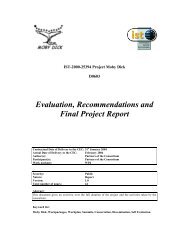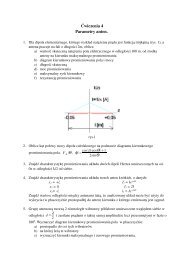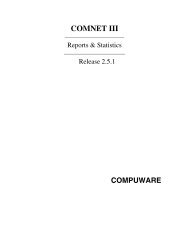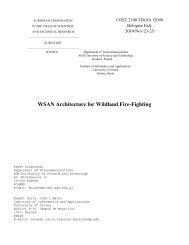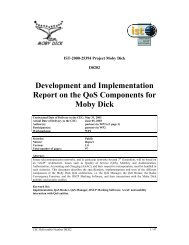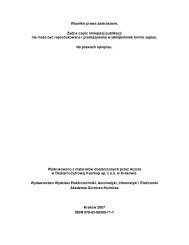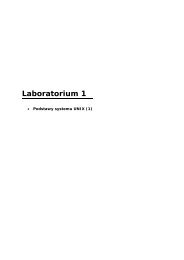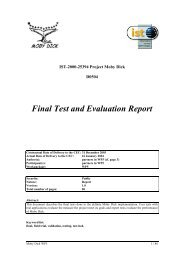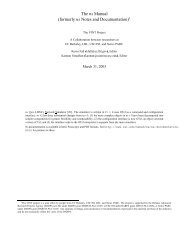Moby Dick Consolidated System Integration Plan
Moby Dick Consolidated System Integration Plan
Moby Dick Consolidated System Integration Plan
Create successful ePaper yourself
Turn your PDF publications into a flip-book with our unique Google optimized e-Paper software.
D0103v1.doc Version 1 6.7.2003<br />
Then some information about the connection will be transmitted to the Radio Gateway, via message<br />
DATA_TRANSFER_REQUEST. The parameter data will be a specific message type<br />
(NAS_CONNECTION_INFO), and the transmitted information will be the Home Address and the CoA of<br />
the Mobile Terminal.<br />
- Upon reception of a request to close the connection from the RCM, it will request the AS to execute it,<br />
via message CONNECTION_RELEASE_REQ. After this, it will notify the RCM, that the connection has<br />
been closed, passing the parameters local connection reference and status.<br />
The connection cannot be closed on the Radio Gateway initiative.<br />
- Upon reception of a notification from the AS, that the connection has been lost, via message<br />
CONNECTION_LOSS_IND, it will notify the RCM, with the local connection reference as parameter.<br />
Paging sub-block<br />
The paging sub-block directly transmits the IP paging packets received from the AS, via message<br />
NOTIFICATION_IND, to the Control Packet sub-block, of the Packet Reception block, of the RCM.<br />
These IP paging packets will be passed to the IPv6 stack, and will automatically reach the Paging module.<br />
TD-CDMA EUI-64 identifier<br />
The hardware identifier of the TD-CDMA driver will be based on the IMEI of the Mobile Terminal. By<br />
construction, we will not be able to use it directly as a MAC address (like for Ethernet or WLAN), as its<br />
format is different. Therefore, we will have to build the EUI-64 identifier by ourselves and register it to<br />
the TD-CDMA device driver. This will be used to build the IPv6 address.<br />
4.1.2.4.2 Control Channel Management block<br />
When the connection is established with the Radio Gateway, a radio control channel is automatically<br />
allocated. Therefore there is no need to open / close control channels.<br />
Any IP control packet received from the RCM (with the associated local connection reference) is<br />
transmitted to the AS, via message DATA_TRANSFER_REQ, to be transferred to the Radio Gateway on<br />
the radio control channel.<br />
Any radio control packet received from the AS, via message DATA_TRANSFER_IND, containing IP<br />
signalling, is transmitted to the RCM Packet Reception block.<br />
The parameter data of the DATA_TRANSFER_REQ and DATA_TRANSFER_IND will be a specific<br />
message type (NAS_IP_SIGNALLING), to identify the content of the AS message as IP signalling.<br />
This IP control packet can be pure IP protocol signalling, but also specific signalling for AAAC and<br />
mobility.<br />
Some signalling specific to the NAS can also be exchanged between the Mobile Terminal and the Radio<br />
Gateway, using a specific message type for the parameter data of the DATA_TRANSFER_REQ and<br />
DATA_TRANSFER_IND messages. This will not be addressed here, but directly in the sections where this<br />
signalling is used.<br />
4.1.2.4.3 Data Channel Management block<br />
Open / Close Data Channels sub-block<br />
When the connection is established with the Radio Gateway, no radio bearer is established.<br />
Upon reception of a request from the RCM to open a radio bearer, a DATA_TRANSFER_REQ is made to<br />
the AS, to transmit to the Radio Gateway the request for opening the radio bearer. The parameter data of<br />
the DATA_TRANSFER_REQ message will be of a specific type<br />
(NAS_RADIO_BEARER_ESTABLISHMENT_REQ), to recognize the radio bearer establishment request,<br />
with the DSCP code, the source and destination IPv6 address of the packet, as parameters.<br />
An answer is expected from the Radio Gateway, that will be received by the AS and transmitted to the<br />
RCF: RADIO_BEARER_ESTAB_IND, with the parameters: local connection reference, radio bearer id,<br />
SAP id, radio QoS class, DSCP code.<br />
A status is sent to the Packet Transmission block of the RCM, to confirm the opening of the radio bearer<br />
associated to the radio QoS class, with the parameters radio bearer id, SAP id, radio QoS class, DSCP<br />
code.<br />
A timer with a timeout will be started after the DATA_TRANSFER_REQ message has been sent, and if<br />
the RADIO_BEARER_ESTAB_IND is not received before the timeout, a negative confirmation will be<br />
sent to the RCM, indicating that the radio bearer is not opened.<br />
The requests to open radio bearers can be treated in parallel, as the message<br />
RADIO_BEARER_ESTAB_IND contains all the necessary information to identify two different requests.<br />
A RADIO_BEARER_ESTAB_IND message can be received spontaneously, if the opening of the radio<br />
bearer is on the Radio Gateway initiative. In this case again, the parameters of the message will enable its<br />
treatment.<br />
If a RADIO_BEARER_RELEASE_IND is received from the AS, parameters: local connection reference<br />
and radio bearer id, a message must be sent to the Packet Transmission block of the RCM, with the<br />
D0103v1.doc 32 / 168



